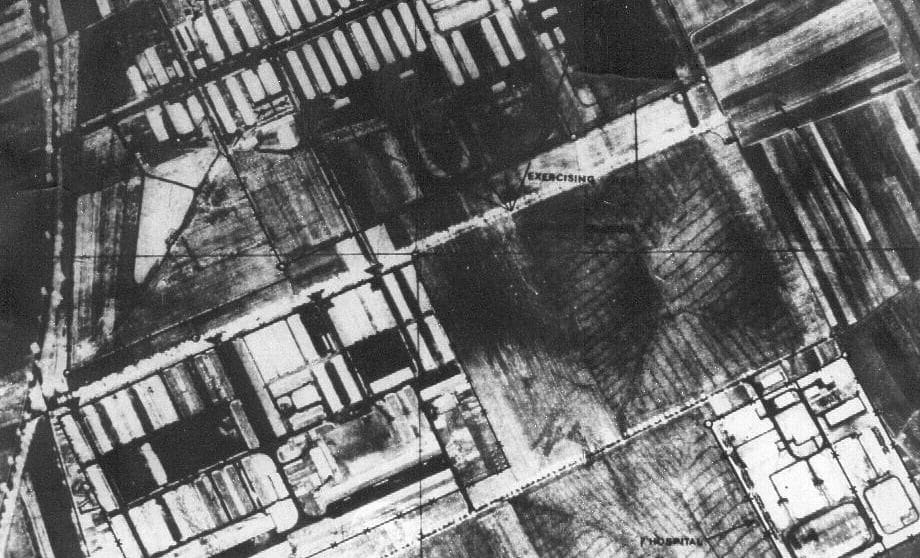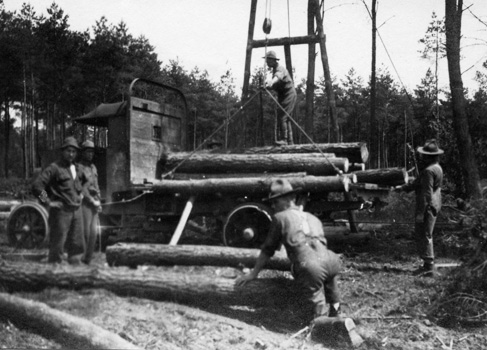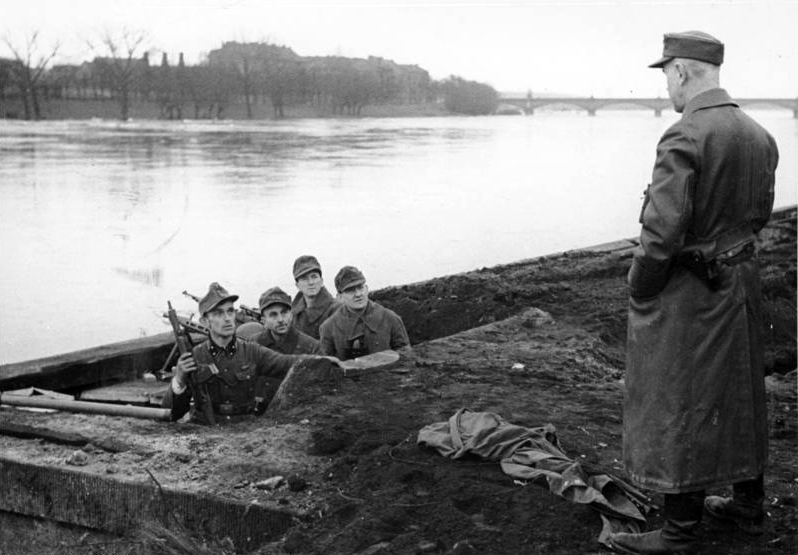Editor’s Note: Sandboxx News presents a World War II series by Kaitlin Oster on the power of hope, letters, and love in seeing us through the terrors and agony of war. You can listen to Kaitlin’s radio interview about the series here or visit her website here.
Weeks had passed since Harold arrived at Stalag 7A in Bavaria. He was put in with 1,300 or so other Air Corps enlisted men. Harold learned that it was already September, and to his relief, Loretta finally learned of his well-being. However, the small shred of joy barely made a dent on the dire situation he found himself in.
However, Stalag 7A was a transit camp. He would be held until his inevitable transfer to Stalag XVII-B, a prison camp for enlisted men.
XVII-B was constructed in 1938 as a concentration camp for Poles, but was converted after 1940 when the war began to gain momentum and the Germans needed prisoner housing for their military counterparts. Stalag 17B was already overcrowded, something Harold had learned from the chatter among the other prisoners, and he was scheduled to be dumped in the middle of it. Soon, Harold would be surrounded by barbed wire and thick, muddied ground. XVII-B’s population consisted of – among other Americans – French, Italians, Russians, and Yugoslavians. All captured somewhere, all stuck in this hell.
Harold arrived at XVII-B to see rigid, overcrowded buildings and recreational areas flooded with men. Americans were given five separate compounds and quarters to sleep in, each capable of holding just over 200 men. He stepped lightly, though, as the barracks housed somewhere closer to 4,000. The bunks were hard, wooden slabs with beds – or what advertised themselves as beds – made of straw and dirty cloth. They were stacked three bunks high.

There were many men there, already tired and weak from months of imprisonment, all sharing bunks with two or three to a bed in order to keep each other warm in the frigid German evenings. It was nearing autumn, and Harold was reassured that he’d appreciate the extra bodies surrounding him at night. In the middle of the camp were the latrines – at one point covered – now partially covered. Harold assumed the men were slowly dismantling the outhouses in order to burn the wood for warmth.
He was scared. He was happy to be alive but he thought to himself that Stalag 17B very well may have been a punishment worse than death. The men were in varying stages of hunger and ill health; it was as if he was bearing witness to what his own future would hold. At that point in the war and his imprisonment, the only thing keeping him going was the thought of Loretta back home, waiting for him and hopefully aware that he was, in fact, alright. He couldn’t wait to get a hand on some pencil and paper to write to her. He longed to see her beautiful cursive lines, telling him about how lovely things were back in New York.
Related: The Tankette – The most adorable tank ever created
Stalag 17B, barrack number 36B, serial number 32319141

The men in the barracks of XVII-B welcomed him. Barrack number 36B, serial number 32319141, or just Harold. Or Red because of his hair. He told them the stories of what happened back near Kassel, asked them about the other nine men he was with that day, and hoped to find them among the sea of prisoners he was now a part of. He was still unaware if his crew was lucky enough to survive the bail-out.
For a prison camp, there was a noticeable bustling amount of men and different languages heard across the barracks – hollers and shouts, a couple of laughs, a couple of cries. He looked about at the stark reminder that he was imprisoned. It was morning and Harold noticed for the first time in a couple of days that he was truly hungry.
“What do they serve us for breakfast here?” His bunkmate looked sympathetically at Harold, his face already gaunt from malnourishment. Although melancholic in appearance, he put a comforting hand on Harold’s shoulder.
“Morning,” he started, “well, morning is hot water, Red.” Harold swallowed hard.
“Hot water?”
“Yep,” the man replied. “Monday through Sunday, friend. We get hot water in the morning. Sometimes they give us coffee. Jerry coffee is garbage but at least it’s got a bit of zing to it, you know? Sometimes we’ll get bread and butter in the afternoons. They served us corned beef once but I’m not entirely sure if it was actually corned beef. You eat it anyway because you don’t know when you’re going to get fed again.”
Related: This is how tabasco sauce made it in MREs

“Don’t think about asking for sugar with your coffee, either. Shit always tastes like mud but it’s warm and sits longer than hot water. If the soup has maggots or beetles in it just eat them, or pick ’em out. You won’t get points for complaining. You won’t get seconds either, and you’ll need the protein.” Harold followed the man around as he was introduced to other prisoners and laid out different parts of the camp.
“That latrine over there is getting more and more barren, too, so I hope you’re comfortable shitting with an audience.” He pointed to the dilapidated toilets that Harold noticed earlier that morning. He let out a weak laugh, not because what his bunkmate said was funny, but because it seemed to be what would have been an appropriate time to break up the sad state these men were in.
“Over there is where we get our parcels and letters. Over there is the infirmary – the Red Cross will send packages and sometimes we can trade with the Red Crosses from other countries; the Brits always have some helpful things. Anyway,” he clapped Harold on the back, “welcome to hell.”
The two men stood in the middle of the barracks with the warm September sun on their backs. It was a welcome comfort, with the looming cold season approaching. Harold wasn’t entirely sure how long he was destined to stay in XVII-B, but he knew that when he left – when – he would do so on his own two feet and not in a body bag. After a few moments, the men continued their informal tour of the camp.
Unfortunately, Harold wasn’t able to locate any of his other crewmen from Classy Chassis in Stalag 17B. He hoped that after he got a letter or two out, someone on the other side would be a more reliable informant of their whereabouts. He had to get in touch with Jack or Ned – or both – he thought. He had to reach out to his mother and Loretta; he had to get word to Artie.
Related: Letters to Loretta: Falling in love with the B-17 Flying Fortress

September 28, 1943
Tuesday
Dear Doll;
I already knew Ha was a prisoner of war from his sister Eleanor. She has also given me his address.
Gee whiz – you’ll never know how much I worried as I waited for the news which I had hoped would come true. As you can figure out I wasn’t positive.
You know what Doll – I can now give you a picture of what I saw that day.
Well to begin with, we were in front of Ha when things got quite warm. Then suddenly I heard Fred call me and say Kelley’s in trouble. As usual – we always keep an eye on each other.
I watched whenever I could to see what was taking place, then I waited, and waited, for the chute to get out. Oh, if that gang only knew how I cursed and prayed for them to hurry they’d never forgive me. A thousand years came and passed before, out they came, 5 of ’em was all I could see. When we got back home Fred looked at me and I at him, neither of us caring to say what we thought. Higgins, my tail gunner and Marble, my waist gunner, must have read our minds for the first thing both said was, “Don’t worry, we saw ten open.” Doll we were so happy knowing at least they had a chance that tears came into our eyes (must have been someone’s cigar).
Those two, Red and Little Joe along with Fred and I were always seen together. If one was around, you knew the others weren’t far away.
You haven’t any idea how much you can become attached to a guy. Here’s an incident about Fred that is exactly true even if he won’t admit it. Until he knew Joe was OK he wouldn’t listen to the song “Don’t Get Around Much Anymore.” Joe always sang that, among us it was quite a joke. He had short legs and Fred is 6’1”.
About Red all I did was pray, hope, and wait. My prayers were certainly answered as was yours and all the rest.
Remember the letter I wrote you in which I tried to answer your questions. I know it was vague. It was to me I know, but certain people were around and I did the best I could.
When you write Red, tell him we are OK and don’t worry about us even tho he won’t hear from us except through other sources. We aren’t allowed to write prisoners of war as it may give away military information. If you can tell him anything, tell him I’ve got only 9 more to go. For your information I’m gonna be here a long while now that we got to be the group leader and I’m sure things aren’t going to be easy for us.
My look how I’ve rambled on. You must think me an old man with a lot of gab so I better leave off now and bid you goodbye.
Take good care of things Loretta and if you can spare an extra prayer I know a fellow that can use it.
The old man,
Jack
P.S. Tell Red that DB Adams, Karl Alexander, and CC Jones are OK. They went down with Ha.
Read more from Sandboxx News
- The favorite games of BUD/S instructors that SEAL candidates suffer through
- End of an era: The last class of Marine Scout Snipers graduates next month
- Garrett STAMP – The Marines nearly got a weird flying jeep during the Cold War
- Appearance is everything in the age of digital warfare
- F-35 versus A-10 showdown revived as new documents come to light



